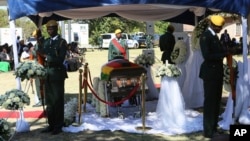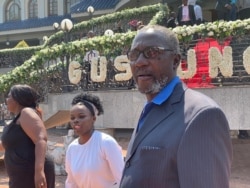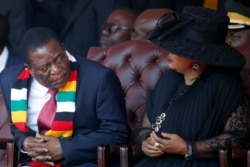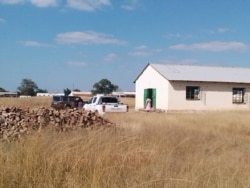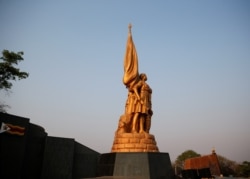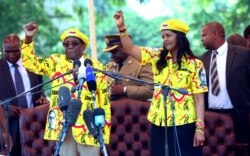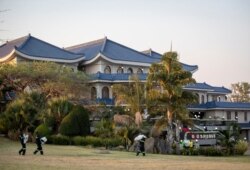Relatives of the late former President Robert Mugabe say they will defy a village court order to exhume and rebury his remains in accordance with local traditions. In an exclusive interview, Leo Mugabe, who is the former president’s nephew, said Chief Zvimba’s order would be taken to the highest court in Zimbabwe if the matter is not resolved at village level. He speaks with VOA Zimbabwe Service’s Gibbs Dube about this and other related issues.
Gibbs Dube (GD): What’s going on here Mr. Leo Mugabe as your family has been ordered to exhume the former president’s remains from his homestead?
Leo Mugabe (LM): Sure, we have not seen the judgment but I have heard a number of people calling me, and telling me that there is a ruling that we must exhume the body, by the 1st of July. So that ruling, to us, you know, the ruling against the widow. The widow has got nothing to do with the burying of her husband. It was the Mugabe immediate family, immediate family who are responsible – the people that made that judgment, that decision to bury him where he is buried. So this judgment, its irrelevant, if you ask me. In any case, Chief Zvimba is not the chief who presides over Kutama (area). Chief Peperere is the one who presides over Kutama, with Chief Shorai as his headman, Kutama as his associate. So, to jump all these people as if he is the paramount chief, and there’s nothing that is called a paramount chief, according to the Traditional Leaders Act. Therefore, you know, if that is their belief, while they are talking between themselves as chiefs, that is their talk. But the law does not provide for the paramount chief.
GD: So now you haven't received, you haven't received the judgment itself from the village court?
LM: No, they just put it on social media.
GD: So, what are you going to do because there's a deadline here, you know, for the government to move in? What are you going to do?
LM: No, our government is a responsible government. It has to talk to us the immediate family. Failure which, we simply go to court.
GD: And in this case the government, I believe, actually assisted in the burial of the late president, former president.
LM: Exactly, and there was no argument with the government. The delays were caused by the disagreements that were within the family itself, not with the government. The government had accepted when we said we are burying him in Zvimba, they accepted and they assisted. And on the day of the burial, Chief Peperere was there, at the burial. Now, if you, if you read The Independent (weekly newspaper) of last week, you then find that, you know, there was a meeting sometime in September, the chiefs went to the president (Emmerson Mnangagwa) and presented the matter that we want to exhume him and bury him properly. And the president asked them a question, that, ‘how are you going to deal with the people’? The reaction of the people and things like that. And he warned them to think twice about this.
GD: OK.
LM: So, all they want to do is to be relevant to President Mnangagwa. To say you know, your wish that you wanted him to be buried at the (National) Heroes Acre, we are now going to facilitate that wish, be fulfilled. It is irrelevant.
GD: But as the Mugabe family, you are saying no.
LM: No. We are saying no.
GD: So, is there any way that you can block the government if it wants to move in, exhume the remains and rebury them somewhere?
LM: No, the government cannot move in without talking to us. They cannot move in. They will need a court order, you see … they will need a court order to do that. They are not stupid. Yes, they will need a court order to do that. Since when does the government listen to a chief? Moreso to a chief who is presiding over a matter which is not in his area.
GD: Why is this chief interested in this matter, and I understand he is part of the Mugabe family as well. Why is he interested?
LM: No he is not. He is not. He is not a Mugabe. You know in the Zvimba dynasty, there are three families. Three families. Chidziwa family which is the youngest, which is the dynasty which we originate from ourselves. Then there is the Peperere dynasty, which is where the chief is from. Then the Chambara dynasty, which does not have chiefstanship, because Chief Zvimba presides over that area. We have a headman, you see. Because if they had given Chambara the chiefstanship, he would have had no area to preside over. When this whole thing was rearranged, it was rearranged in such a way that he would still have an area where you will preside over and be able to (ripisa vanhu) and things like that. But as we stand now, the chief who presides over Kutama is Chief Peperere.
GD: So now, why do you think Chief Zvimba is interested in this matter and why is he targeting the former first lady?
LM: Because they did not see eye to eye during the funeral.
GD: Why:
LM: They were the ones who were pushing for the Heroes Acre. You see? They are the ones pushing for the Heroes Acre, and the immediate family was saying no we must follow the late president’s wish. You can not bury him at the Heroes Acre against his wish. So that is where it originates from. At the actual funeral, the actual funeral, Chief Zvimba did not attend. He did not attend. So he wants to be relevant, to be seen to be attending the one that he had wanted to happen.
GD: And you are saying that's not going to happen?
LM: It’s not going to happen.
GD: Yes, and tell us a bit about the former First Lady – she did not attend the court, the village court. Where is she?
LM: She is not in the country. She's out of the country and I understand she is not well also …. even if … you get summons, you find that the person is not around, so, you see. This case should have gone to the kraal head first, you know, instead of going to the Supreme Court. It’s like, you send a case to the Supreme Court at the first instance, and after the Supreme Court you don’t go anywhere. Let’s follow the hierarchy of the courts. They should have gone to a kraal head, then to a headman, then to Chief Peperere That would have been the right thing to do. So, they didn’t do that. So the chief is, even if he was the right chief to do it, his judgment is not final. There’s still the magistrate’s court, the High Court, and the Supreme Court. If it’s a constitutional matter, which I think it is, because he has got no jurisdiction, we would go to the Constitutional Court.
GD: And you are ready to challenge the Chief’s decision?
LM: We are ready to take him on.
GD: So tell me tell me a little bit about this rumor that Mr. Mugabe was buried with a certain important ornament – a specter or something?
LM: No, that’s all rumors, there’s nothing like that. No, there's nothing like that. These are people who are just speculating, you know, that he had (tsvimbo). But who would have given it to him.
GD: So he didn’t have the tsvimbo?
LM: Yes, he didn’t have. If he had been given a tsvimbo and they know who gave it to him, they must go and source another tsvimbo from the same person. You are talking to … this man (Mugabe) was just a Roman Catholic, was a Christian. He did not believe in all this tsvimbos and things. And they all know it. Even the government, they know it.
GD: So then what's going on if he didn't have the tsvimbo and all these things. What’s going on? You know, Mr. Mugabe, I think you are one person that is very honest with this issue. What's going on here?
LM: I think there are people who are trying to be relevant … those who are bringing up the tsvimbo issue. I understand its been brought up in some political circles and they actually believe it exists. Then there is the side of the chief who are trying to be relevant, to be seen, to say to Mnangagwa, no we are not bitter with you for removing our relative, and therefore to show you that we are not bitter, we are prepared to exhume him and rebury him at Heroes Acre. So they are being, you know, this chief is trying to be relevant in the eyes of the president. And that’s it.
GD: And at the same time, Mr. Mugabe, he’s talking about the late former president’s property. Where is the property and why should it be brought to one place? Have you shared it, you know, what’s going on with the property?
LM: We have already shared … we’ve already shared. We’ve done all that. The other responsibility of a nephew, a muzukuru like me, you get my point? That’s where I come in, and we did it. It’s done. Finished. We don’t call these people, anashe, distant people, you only call close relatives. You only call close relatives. I have some clothes that used to be his, that were shared on that particular function.
GD: And even some immovable property, right?
LM: Immovable … some of those things were left for the kids, for his children. So basically, its normal. Its normal. Movable things, you know clothes, this … they were all shared, we shared all that.
GD: And normally, what we know in our culture, or let me say in some cultures, the mzukuru then takes over the wife. Did you do anything?
LM: No, I didn’t. The Gushungos might first try and if they failed the mzukuru will try his luck.
GD: The last question is on the five cattle, you know, five cattle and one goat. Are you going to give him, this guy?
LM: No, but you see, what he is doing is taking somebody who was married in a family, and he is saying now, you the widow, you must pay. Because, you see, he is suing the wrong person, and this person that he is suing, will then say, you know we are going to take the cattle from the deceased’s cattle. Who are you punishing? Who are you punishing? The children? Who? People who you didn’t … people who you did not invite to any hearing, are the ones you are saying, go and pick up … because if the cattle were given to the kids, the children, you are now saying go and get the cattle from the children. These children are above 18. They should be cited in many court papers in their own right.
GD: Your last word, Mr. Mugabe?
LM: I think this whole exercise is an exercise in futility, right here in. It will not yield the required results. It will just mess us up as a country, our image and the image of the government and everyone else, because it is not necessary. All this is not necessary.




